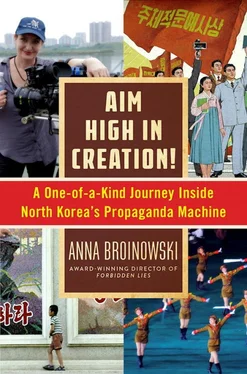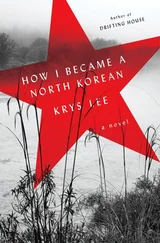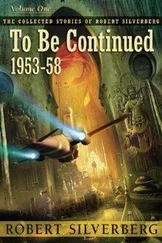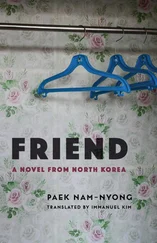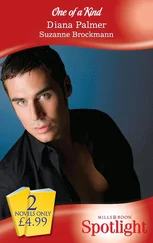Q blinks slowly and nods: “It’s okay. You can tell her.” The soldier squares his shoulders, and faces our camera. We have to tilt up to catch his eyes: he’s at least six foot four. “Ma’am, a lot of countries, including Australia, made the mistake of fighting us in the war,” he begins, in a respectful tone. “They should not have done it. They were just the lackeys of America.”
I nod politely, assuring him I do not condone any of the wars my country has followed America into. In my peripheral vision, I can see Q following every word. “What do you know of Australia?” I press. “Bondi Beach? Mel Gibson? Mad Max ?”
The soldier’s eyes light up at Mad Max , but Sun Hi’s not going there. “Do Australian visitors who come here have no moral code?” she says, brutally changing the subject, and the soldier laughs: “Of course not. The Australians are fine,” he says kindly, and holds out his hand. I shake it.
“I’m relieved to hear that,” I say, smiling. “Now tell me what Mel Gibson movies you’ve seen.” The soldier giggles and shoots a look at Q, as if he can’t believe my audacity. “Ma’am, just as you and I can stand here smiling at each other, I hope we can forge a new peace between our countries,” he says. “I hope you can portray in your movie the tragedy of our divided nation.” He’s grinning broadly, but there’s a yearning in his eyes. He still hasn’t let go of my hand. He holds on to it all the way back to the van, as if it’s an umbilical cord to the world outside.
The tragedy of my young friend’s divided nation stays with me on the highway back to Pyongyang. What would it feel like, I wonder, if a hostile, foreign force suddenly shut Queensland off from the rest of Australia? Bad example: the banana benders are so crazy, the rest of the country would be relieved. The west coast of America from the east, then: the border slicing straight down, from North Dakota to Texas. Families severed for sixty years. No trade. No news. No hope. How would that be? The Koreans I’ve met on both sides of the DMZ long for reunification. The real tragedy is both China and the US have a strategic interest in stopping it. And now, a new generation of South Koreans are too prosperous to care. To the future-focused twenty-somethings driving the Korean Wave in Seoul, the North Koreans are a deluded, redundant nuisance.
I wonder how the soldiers in Pyongyang would react to this news. There are a thousand of them watching us right now as we follow Q along the Taedong’s banks to get pick-up shots of the USS Pueblo . The soldiers are lined all the way up the hill in symmetrical rows. It’s something I would love to film: these fresh-faced boys, with their identical uniforms and stern expressions, look just like the military portraits the regime stages in Kim Il Sung Square to convince the West of its power. But instead of Kim Junior 2.0 standing solemnly in the foreground, Nic and I are there in our sloppy jeans, filming the Pueblo’s hull. We can feel the soldiers’ unwavering gaze drilling holes into our backs. We’re flesh-and-blood targets, after all: the very enemy they’ve been trained to kill. Then I remember my soldier friend at the DMZ. I turn around and fix the closest row of soldiers with a sunny grin. “Gidday! How’s it going?” I say. The soldiers blush and giggle—their boyish warmth rippling back through the crowd, like a Mexican wave. By the time Nic’s finished filming her close-ups, a thousand faces behind us are smiling. If Q wasn’t there, I suspect they’d applaud us for a job well done.
“WE HAVE CONCERNS WITH YOUR FOOTAGE,” says Guk, as I copy the Pueblo files onto my laptop back at the Yangakkdo. Ms. K has scheduled our meeting over lunch, and our cables are coiled around plates of noodles and omurice —a popular Japanese egg snack stuffed with rice.
“What are your concerns?” I ask, wondering how many of our eighty hours Guk has actually watched. Even without sleeping for two days, he’d only be able to get through half the rushes—unless he fast-forwarded—or had assistants. Guk is alert and well rested: Korfilm has obviously given him a team.
“There are three major problems,” Guk says coolly, sipping his tea. “First, we do not appreciate the way Senior Comrade Pak speaks positively about Western films. Second, there are too many soldiers in every exterior shot. And third, most serious of all…” Guk looks gravely at Ms. K and Q, and my mouth goes dry. He’s going to make me delete the flirting lovers in khaki, or wipe everything we filmed with Pak. “The third problem I must show you direct,” Guk continues—and expertly navigates QuickTime X to pull up our interview with Ms. Yun in the brothel.
Everyone cranes over the laptop. Ms. Yun is reciting a slogan that all North Korean actors learn, as part of their ideological training: “Oh Glorious Fatherland, let Us Devote our Hearts to Your Greatness! ” she chants, then bursts into a fit of embarrassed giggles. It is clear she thinks the slogan sounds ridiculous. Q and Ms. K frown at Guk, and I look at Nic. Ms. Yun’s laughter is one of the only times our North Korean subjects have shown anything close to subversion in the face of the Party line. I already know it must be in the film.
“That’s no good at all.” Ms. K frowns, and I reluctantly reach for the laptop, to delete the clip. But Guk waves my hand away, pausing the image. “I want you to understand why this is a serious offence,” he says, pointing at Ms. Yun’s left breast. “See your microphone wire? It is obscuring the image of Great Comrade Kim Jong Il.” Nic and I peer at the offending wire, and sure enough, two millimeters of it sits over Kim’s right eye on the badge pinned to Ms. Yun’s collar.
“Oh,” I say, concealing my relief. “I am sorry. We can matt out the wire in the edit.” Ms. K, Q and Guk confer urgently in Korean, and I busy myself with my noodles. Guk and Ms. K are uncomfortable with what Q is saying, but finally, Ms. K nods.
“If you remove the wire and the line of Comrade Pak saying that he likes The Godfather , we have no more problems,” she says. “I personally think you should delete all your landscapes with soldiers in them, but Comrade Q says this is unfair, as everywhere you go in Pyongyang there are soldiers, and you obeyed his instructions as faithfully as you could.” I look at Q, astonished by this show of solidarity. “Yes,” he says. And smiles.
Q’s loyalty to Team Gas continues when we drive to the Arirang Mass Games, the final stop of our shoot. We’re cruising north along the river, and as the sun dips behind the buildings, Q makes the driver stop, so we can capture an unscheduled, golden hour shot of Pyongyang’s workers bicycling on a leafy path. The sun blazes pink in the river, and the workers glide along in contented silence, headed for home. All seems well in their world; somewhere just out of frame, you can imagine their grandmothers, gently lifting kimchi out of terracotta pots, in preparation for dinner.
Boom! Boom! Boom! Sixty thousand feet stamp in unison as Arirang, North Korea’s annual propaganda extravaganza, starts. The feet belong to thirty thousand schoolchildren—the same kids Lizzette and I saw practising under the overpass on our first trip. They are sitting in a huge rake across the arena, holding their placards above their heads. Every few seconds, the children flip the placards, making the images on the rake shift and change, like a giant LCD screen. A rose-framed pistol dissolves to a red-crowned crane, to Kim Jong Il’s birthplace on Mount Paektu, to stallions prancing beside a waterfall. It is an astonishing display of ingenuity and precision. It makes Cirque du Soleil look like amateur hour at the country pub. According to the Guinness World Records, Arirang is the largest event of its kind in the world. And it is defiantly analogue: instead of using computerised lighting displays and digitally generated graphics, North Korea has successfully transformed thirty thousand cheering children into human pixels.
Читать дальше
